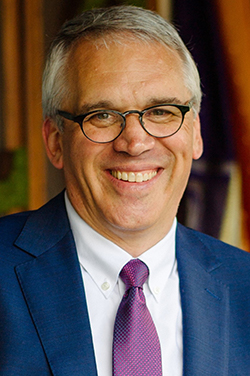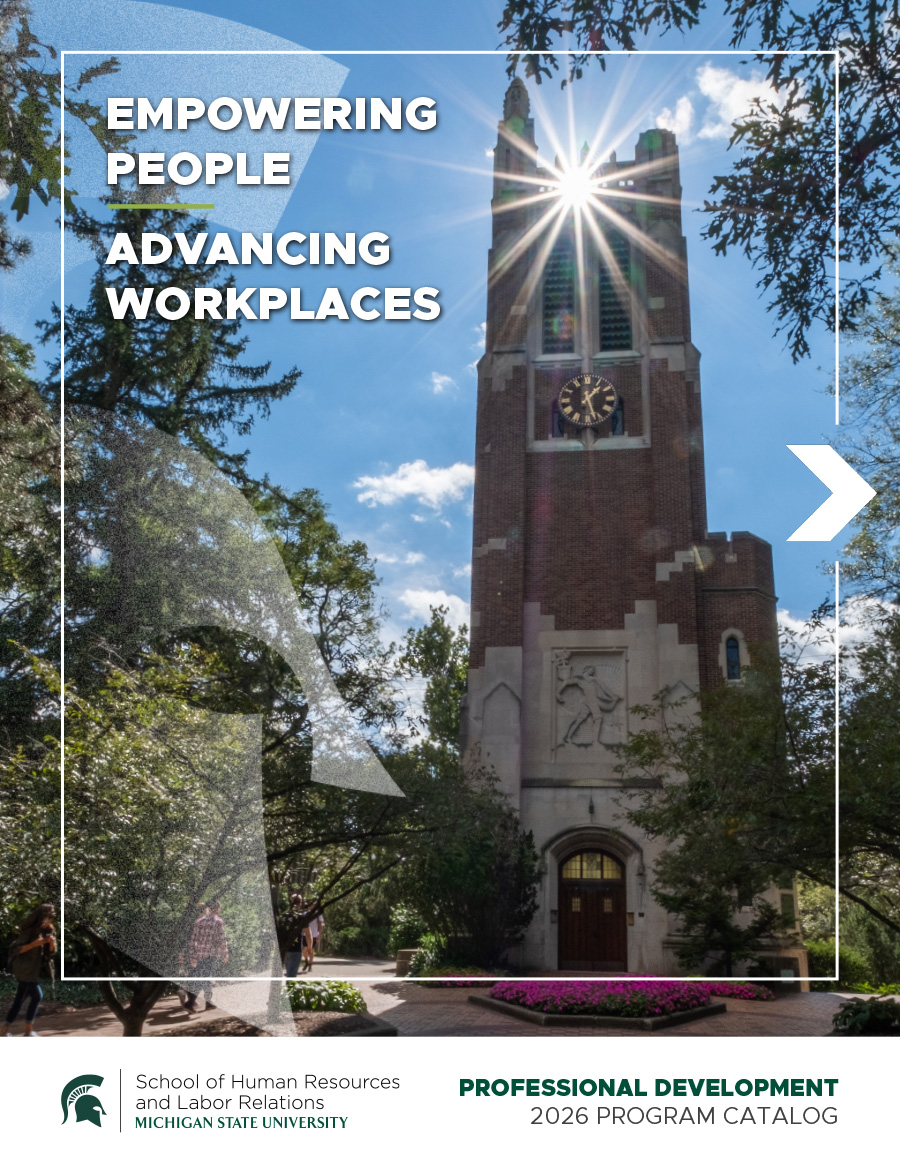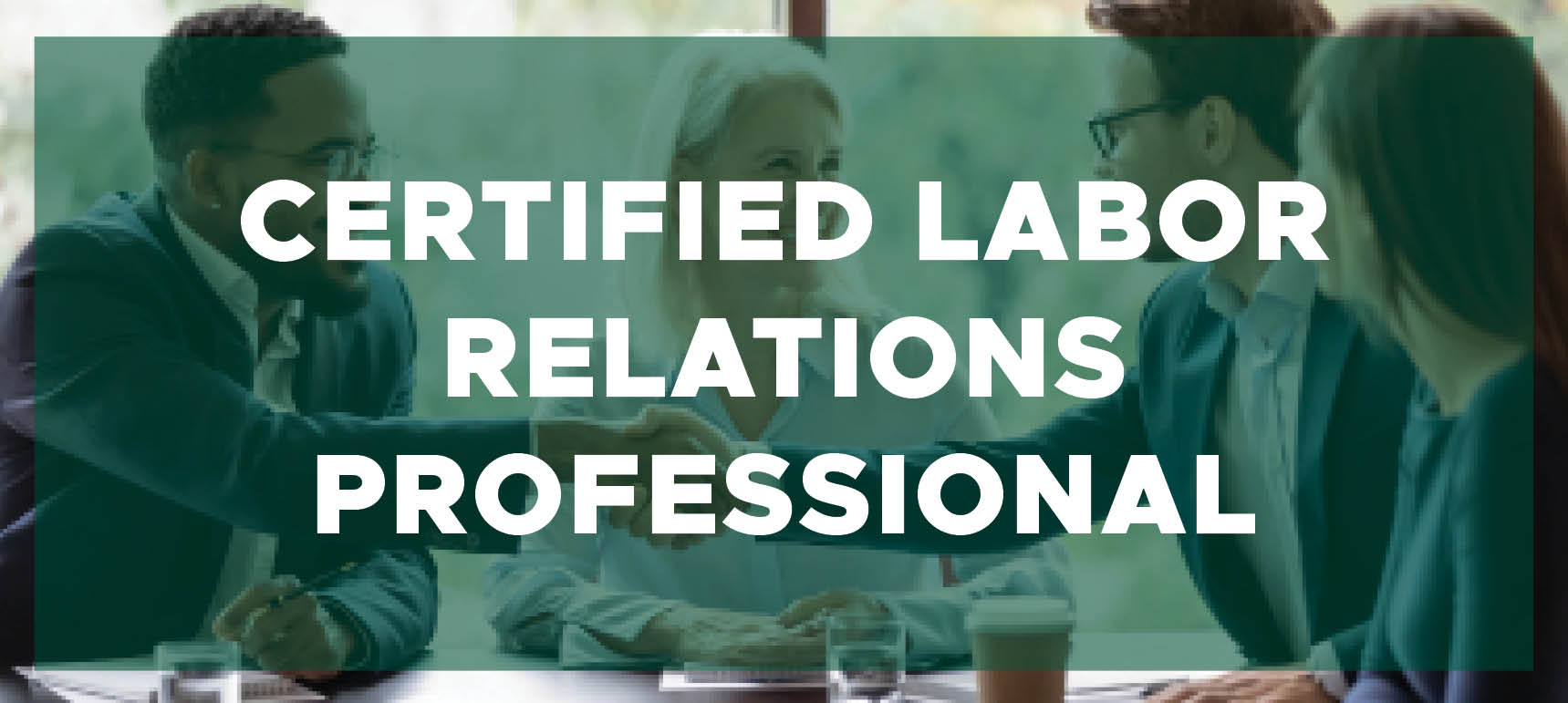Certified Labor Relations Leader Program

REGISTRATION: $3,800
2026 Program Catalog Now Available
We are pleased to share our 2026 Professional Development Program Catalog. View the full catalog to learn more about our signature programs and new programs for 2026, including labor arbitration.
- IS THE CLRL RIGHT FOR YOU?
We offer two Certified Labor Relations programs designed to help you at different stages of your career. If you are not sure which one is right for you, ask yourself the following questions.
Click on each true statement about yourself. The column with the most check marks will be the program best suited to meet your needs.
Certified Labor Relations Professional
If you have more check marks in this column, the CLRP is the program for you.
Certified Labor Relations Leader
If you have more check marks in this column, you are in the right place!
Continue below to learn more about the CLRL program.
LEADING IN LABOR RELATIONS: CERTIFICATION PROGRAM
The Certified Labor Relations Leader (CLRL) professional development program is tailored exclusively for labor relations managers and leaders and brings together faculty and subject matter experts, with real world experience, to navigate today's complex labor relations environment.
If you or a member of your labor relations team have more than five years of labor relations experience and are in a leadership, managerial, or supervisory role - the CLRL program will provide you with leading-edge insights and skills to lead the labor relations function with confidence.
CORE PROGRAM OBJECTIVES:
- Develop advanced expertise in labor relations
- Hone your leadership skills
- Foster relationship building
- Stay current with emerging labor relations trends and prepare your organization for the future of work
PROGRAM DETAILS: CERTIFIED LABOR RELATIONS LEADER
MODULE 1:
-
Leading the Labor Relations Function in today's changing environment
The program begins with a comprehensive examination of the differences between leading the LR function and "doing"”" the LR function and the competencies required of successful LR leaders. You will gain a rich understanding of how being an LR leader requires a different mindset, a different way of thinking, and a long-term, strategic perspective. We will discuss the current labor relations landscape and why it is important to understand the forces changing labor relations in the 21st century.
-
Gaining a Global Perspective
Are you prepared to excel in a rapidly evolving global workplace? In this module, we will delve into the essential differences between US labor relations and the practice of labor relations in other countries. You will not only gain a comprehensive understanding of the key differences but also unlock the vital concepts needed to foster successful labor relations when collaborating with a diverse, international workforce.
-
Leadership
In this module, you will sharpen your communication skills, ensuring you can convey your vision with clarity and inspire your teams to achieve extraordinary results. You will develop the critical thinking skills needed to minimize the impact of cognitive biases and navigate the complexities of leading in a unionized organization. Ultimately, this module aims to help you become a transformative leader who drives not only personal success but also inspires and elevates those with whom they work.
MODULE 2:
-
Contract Negotiations
Successful negotiations are achieved by creating a contract negotiations plan and executing the plan. This does not happen by itself, and organizations look to and trust the Labor Relations function leader to ensure the plan is created and properly executed. Leading the effort involves much more than being the chief spokesperson and ensuring the bargaining goes as planned. In this module we'll discuss and identify the key responsibilities of leading the negotiations vs. "doing" the negotiations. You will learn the organizational expectations of the leader, the importance of stakeholder management, creating a governance model, determining who has leverage in the negotiations, and how this impacts the strategy and plan.
MODULE 3:
-
Labor Law Update
This module begins with an important review of key union and employee rights under the National Labor Relations Act. Engage in robust discussion regarding recent changes in both labor law and labor relations, why these changes matter, and their implications for your organization. These discussions will ensure you and your organization stay current with the ever-changing NLRB direction and guidance.
-
Dispute Resolution
Business leaders and plant managers may want you to take every case to arbitration. As an LR leader, you know that's a strategic decision that includes consideration of multiple factors, including when to settle. In this module, you will learn best practices to avoid grievances, gain an advanced understanding of the legal landscape of labor arbitration and the art of selecting labor arbitrators. You will craft an opening statement and engage in a powerful mock arbitration case to hone your ability to win at arbitration.
MODULE 4:
-
Personal and Organizational Change
In this highly acclaimed module, you will learn about the theory and practice of personal change, and why it's important for LR leaders to understand. Through a comparison of the Sigmoid Curve and the Kübler-Ross Change Curve you will understand the personal change process before moving into an exploration of the organizational change process necessary for individual and organizational success.
-
Actionable Communication for Labor Relations Leaders
Part I - Interacting with the media: The media is everywhere, and labor relations leaders need to be prepared to respond to media requests and reporters' questions. Learn how to identify the best spokesperson for your organization, who should and should not talk with the media, and explore strategies for handling difficult questions and how to create and deliver effective messages.
Part II - Business Storytelling: Participants will learn practical techniques for creating clear, impactful stories that communicate important information and inspire action.
MODULE 5:
-
Capstone Project Report Outs
This program includes a unique capstone project, providing participants with the opportunity to apply new learning and freshly honed skills in their organization. Throughout the program, participants will be encouraged to look for opportunities to apply the concepts covered during the program to opportunities and challenges facing their organization. The class concludes with participants sharing which concepts they used, how they applied the concepts, and the organizational impact of their efforts.
BECOME A LEADER IN HR WITH LABOR RELATIONS EXPERTISE
Professional credentials are more important today than ever before. Earning your professional certification from MSU's School of Human Resources & Labor Relations, one of the best and most respected human resources and labor relations schools in the country, demonstrates mastery of content and commitment to the field of labor relations.
THE CLRL DESIGNATION
Individuals who successfully complete the program and capstone project will earn their certification and will be recognized by Michigan State University's School of Human Resources & Labor Relations as a Certified Labor Relations Leader. They are entitled then to use the designation CLRL after their name.
They should expect a notification with their certificate via email two- to three-weeks after the completion of the program.
ADDITIONAL LABOR PROGRAMS
REGISTER FOR CERTIFIED LABOR RELATIONS LEADER
April 28 - June 4, 2026
Meeting on Tuesdays and Thursdays
1:00pm - 5:00pm ET
Live Interactive Program via Zoom
REGISTRATION FEE: $3,800
REGISTER NOW
(Registration closes on April 26, 2026 at 12:00am ET)
PROGRAM SCHEDULE
-
- This is a 5-week program meeting on Tuesdays and Thursdays from 1:00pm - 5:00pm ET
- Week 1: Tuesday, April 28 & Thursday, April 30, 2026
- Week 2: Tuesday, May 5 & Thursday, May 7, 2025
- Week 3: Tuesday, May 12 & Thursday, May 14, 2025
- Week 4: Tuesday, May 19 & Thursday, May 21, 2025
- Week 5*: Tuesday, June 2 & Thursday, June 4, 2025
(There will be no sessions during the week of Memorial Day)
- This is a 5-week program meeting on Tuesdays and Thursdays from 1:00pm - 5:00pm ET
MSU employee discount & education assistance available. Please contact Kristi White at whitekr@msu.edu for more information.
INSTRUCTORS

Mary A. Bedikian, JD, is the former District Vice President, Detroit Region, of the American Arbitration Association, an organization for which she worked for 28 years. Her extensive experience in Alternative Dispute Resolution (ADR) spans many sectors and includes training mediators and arbitrators in both the process and substance of ADR. Ms. Bedikian is an instructor for Administering the Labor Contract, Managing Grievances, and Preparing for Arbitration.

Greg Freehling, has developed labor relations expertise during a 30-year career in plant, business, and corporate labor relations roles for Alcoa and its spinoff, Arconic. He retired from corporate life as the Director of Labor Relations for Arconic. He has been teaching with Michigan State University’s School of Human Resources and Labor Relations since 2013, creating and conducting labor relations training programs for the School. He graduated from the program with a Master’s degree in 1990.
As Arconic’s Director of Labor Relations he was accountable for the labor relations function for the corporation. He has led and managed the relationships and efforts required to create successful labor outcomes. In addition to redesign efforts and multiple stand-alone contract negotiations, he and his team also negotiated the master contract between Arconic and the United Steelworkers.
He is a subject matter expert with an extensive background in leading cost improvement initiatives, contract negotiations, managing stakeholder communications, contract administration, as well as grievance and arbitration advocacy. He has negotiated with various unions in the US and Canada, including the United Steelworkers, United Autoworkers, and International Association of Machinists. He has provided training, advice, and counsel across Alcoa and Arconic locations in the US, Canada, and Europe.
He has been affiliated with Michigan State’s School of Human Resources since 2013 as an Adjunct Professor. In this role he has developed and conducted labor relations training programs for labor practitioners and line leaders. These programs include customized programs for specific clients and open enrollment programs for a broader population.
In addition to teaching for the School of Human Resources and Labor Relations, Greg continues to provide consulting expertise and training programs through his consulting firm, Brison Taylor LLC. Its goal is to help organizations looking to improve their labor relations skill sets and operational efficiency.

Joan Hill, JD, practiced law for 13 years with a small union-side law firm in Southern West Virginia before taking a position in the legal department of the Paper, Allied Industrial, Chemical and Energy Workers’ Union in Nashville, Tennessee. She was the Director of Research and Education for PACE and after the merger, remained in the Education Department of the United Steelworkers International Union in both Nashville and Pittsburgh, Pennsylvania. As an educator, she mostly taught legal subjects including ADA, FMLA, labor law, and labor arbitration.
Before retiring in Alabama, Ms. Hill served as the Southern Board Representative for the United Association for Labor Education (UALE) and on the Steering Committee for the Labor and Employment Committee of the National Lawyers’ Guild. Since retirement, Joan has been approved by the Federal Mediation and Conciliation Service Roster of Arbitrators, as a neutral to resolve labor disputes in both the private and public sectors.

Dr. Tina M. Riley, is an Associate Professor in the School of Human Resources and Labor Relations at Michigan State University and served as the School's Director of Professional Development and Associate Director for 20 years.
She is a results-based educator and executive coach with expertise helping individual leaders, and organizations, achieve their full potential through high-impact communications that build trust and promote inclusion and engagement.
Her engaging and holistic approach to teaching facilitates learners' ability to move from theory to practice. Her teaching style makes complex concepts accessible to graduate students and seasoned professionals alike. Dr. Riley teaches academic and professional development classes including leadership and interpersonal skills development, labor relations, developing inclusive workplaces and conducting workplace investigations.
With her passionate and engaging style, Dr. Riley develops and presents customized leadership development programs for both public and private sector organizations, from manufacturing to the courts. Organizational leaders and HR professionals from across the globe including Bahrain, Cameroon, Canada, Georgia, India, and Nigeria report finding her programs to be highly beneficial both for individuals, teams, and organizations.
Dr. Riley holds a Ph.D. in Higher, Adult and Lifelong Education, with a concentration in Communications, and a Master of Labor and Industrial Relations from Michigan State University.
One or more instructors listed above will be teaching
REGISTRATION POLICY
-
Registration closes 2 business days before the start of the program.
CANCELLATION POLICY
- Cancellation fees may be waived if the participant registers and attends the same program within 12 months. Fees may only be waived once.
- Participants may send a substitute from the same organization for the same program and date by notifying Kristi White via email at least 5 calendar days in advance of program start date.
- Cancellation more than 30 calendar days before program start date: full refund.
- Cancellation 14 – 29 calendar days prior to program start date: 50% cancellation fee, remainder of program fee refunded.
- Cancellation 13 or fewer calendar days prior to program start date: no refund.
MSU reserves the right to cancel programs when enrollment criteria are not met or for conditions beyond its control. Any additional costs incurred by the enrollee of canceled programs are the responsibility of the enrollee.
ADDITIONAL INFORMATION
- MSU's Federal ID Number is 38-6005984
- Business casual attire.
- Please, no audio or video recording.
RECERTIFICATION CREDIT HOURS
This program has been approved for 40 continuing education credit hours towards Professional Development Program recertification.
Learn more about Recertification
Questions? We would be happy to answer any questions you may have regarding this or any of our training programs. Please contact Director of Professional Development, Melanie Zaremba at mzaremba@msu.edu.




